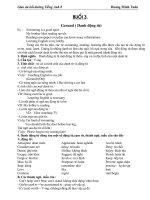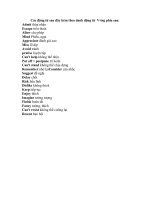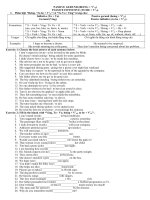Danh động từ
Bạn đang xem bản rút gọn của tài liệu. Xem và tải ngay bản đầy đủ của tài liệu tại đây (121.85 KB, 3 trang )
Giáo án bồi dưỡng Tiếng Anh 8 Hoàng Minh Tuân
Buæi 3.
Gerund ( Danh động từ)
Ex : Swimming is a good sport.
My brother likes reading novels.
Reading newspaper everyday can know many informations.
Learning English is my hobby
Trong các thí dụ trên, các từ swimming, reading, learning đều được cấu tạo từ các động từ
swim, read, learn. Chúng là những danh từ làm chủ ngữ, bổ ngừ trong câu. Khi động từ được dùng
với tính cách là một danh từ như thế này nó được gọi là một gerund (danh động từ).
1. Định nghĩa : Danh động từ là một động từ thêm -ing và có đặc tính của một danh từ.
2. Cấu tạo : V-ing
3. Tính chất : nó có cả tính chất của danh từ và động từ
a, tính chât của động từ:
- Có bổ ngữ của riêng mình.
Ví dụ : Teaching English is my job.
(Gerund) (Obj)
- Có trạng ngữ của riêng mình: I like driving a car fast
b, tính chất của một danh từ :
- Làm chủ ngữ (động từ theo sau chia ở ngôi thứ ba số ít)
VD: Doing exercise is good
Learning English is necessary
- Là một phần vị ngữ sau động từ to be:
VD: My hobby is reading
- Là tân ngữ sau động từ :
VD: I like watching TV
- Là tân ngữ sau giới từ:
Ví dụ: I'm fond of swimming.
You should lock the door before leaving.
Tân ngữ sau đại từ sỡ hữu :
Ví dụ : Please forgive my coming late!
4. Danh động từ dùng sau một số động từ,cụm từ, thành ngữ, mẫu câu sâu đây
A, động từ:
Anticipate: đoán trước Appreciate: hoan nghênh Avoid: tránh
Consider:xem xét delay: trì hoãn Deny: từ chối
Detest: ghê tởm Dislike: không thích Enjoy: thích thú
Escape: trốn khỏi Suggest: đề nghị Finish: hoàn tất
Forgive: tha thứ Involve: có ý định Keep: tiếp tục
Miss: bỏ lỡ Postpone: trì hoãn Prevent: ngăn chặn
Stop: dừng remember: nhớ practice : luyện tập
Love like hate
Continue regret start/begin
B, Các thành ngữ, mẫu câu :
- Can’t help/ can’t bear/ can’t stand: không chịu đựng/ nhịn được
- Get/be used to = be accustomed to : quen với việc gì.
- It’s (not) worth + V-ing: (không) đáng để làm việc gì đó
Giáo án bồi dưỡng Tiếng Anh 8 Hoàng Minh Tuân
- It’s no use + V-ing: thật vô dụng khi làm việc gì
- It’s no good + V-ing : vô ích khi làm việc gì đó
- It's pleasure + V_ing: thú vị khi làm việc gì đó
- There’s no point in: Chẳng có lý do gì/ lợi gì khi làm việc j đó
- Have difficulty (in): Có khó khăn trong vấn đề gì
- It's a wasste of time and money + V-ing: tốn thời gian và tiền bạc để làm việc j đó
- Be busy (with): bận rộn với cái gì
- Look forward to: trông mong, chờ đợi
- Would you mind + V-ing….?
C, Sau V + preposition, Adj + preposition hoặc Noun + preposition là V-ing.
Ví dụ:
accuse of (tố cáo), suspect of (nghi ngờ), be fond of (thích), be interested in (thích thú, quan
tâm), give up, depend on, , reason for (lý do về),Object to: phản đối, Confess to: thú tội, nhận tội,
tired of, ...
5. Những động từ sau đây theo sau là động từ nguyên thể hoặc V-ing mà nghĩa không thay
đổi:
begin, like, love, continue, prefer, start, hate, dread, start, intend, allow, regret.
EXERCISE
I. Build a complete sentence with the given words
1. teacher/order/students/keep silent/class
2. you/good enough/pass/examination
3. I/look forward/receive/letter
4. we/not mind/wait/more minutes
5. she/like/read/romantic stories
6. father/be/used/drink/tea/meals
7. children/busy/collect/shells/beach
8. we/enjoy/spend/summer vacation/Dalat.
9. She / always / want / improve her English
10.Last week / she / buy / English – Vietnamese dictionary
II . Supply the correct form or tense of the verbs in brackets.
1. The teacher let him (stay) ................... at home to finish the assignment.
2. Most people enjoy (travel) ...................... to different parts of the world.
3. It’s no good (write) ..................... to him; he never answers letters.
4. Ask him (come) ..................... in. Don’t keep him (stand) .................... at the door.
5. Mary ( be )………. born in Britain, but now she ( live ) ……….in America with her uncle.
6. When I ( be )…………. young, I used to walk to school.
7. The shoes are too big for me…………………. (wear).
8. She advised………………………….. until tomorrow. (wait)
9. The doctor told me …………………….. these pills. (take)
10. My mother often ………………… cakes, and she ……………… one now. (make)
11. I don’t think I (go)…………………………………. Out tonight. I’m too tired.
12. Would you like ( join)……… My class next Sunday? We (visit)……. the local museum.
13. Linh used to (drive)….. carelessly, but now, he doesn’t. He (drive) …. carefully.
14. By (work)…… day and night he succeeded in ( finish)…. The job in time.
15. There ( be)…. Many volunteers in SEA GAMES 22nd in Vietnam in 2003.
16. The weather ( become)…. Colder and colder in December.
Giáo án bồi dưỡng Tiếng Anh 8 Hoàng Minh Tuân
17. A : What time the film (start)…..?
B : It (start)…. at 8.00p.m.
18. Linh would like ( go )…. to the movies.
19. A: Where (be) ….Linh?
B: He ( water)….. flowers and vegetables in the garden.
20. Your voice (be not)……… loud. I can’t hear you
21. I (read)….. an interesting book at the moment. I (lend)………. It to you when I finish it.
III. Each sentence has one mistake. Find out and correct it.
1. We celebrate our Independence Day in September 2
2. He spent most of his time to paint in the studio
3. What do you do yesterday night?
4. Childs often receive toys and cakes from Santa Claus on Christmas.
5. It is often rains on summer.
6. They usually get up soon at the morning.
7. His father asked him don’t stay up so lately
8. Before going to school, I often review the lessons very careful.
9. We spend many time in practicing our music lessons.
10.Can you to help Jill in England pronunciation?
11.How usually do you go to zoo?
12.There used to have a supermarket nearly my schooling.
IV. Translate the following sentences into English.:
1. Xin lỗi nhé , nhưng mà em phải nấu cơm trưa một mình.
2. Anh của bạn tôi rất thích đọc sách báo.
3. Trong một góc phòng,có một chiếc ghế dựa và một cái bàn.
4. - Các bạn sẽ làm gì vào ngày mai ?
- Chúng tôi sẽ đi picnic.
5. Anh của tôi được sinh ra vào năm 1968.
6. Chúng tôi đã từng chơi bóng đá dưới trời mưa khi còn bé
7. Đã từng có một ngôi chợ gần nhà của tôi.
V. Rwrite the following sentences in such a way that the meaningis unchanged, beginning
with the words given.
1. What’s his age ?
How ……………………….……………………………………………………….
2. How long is your ruler ?
What ……………………………………….………………………………………
3. How heavy is his brother?
What ……………………………………………………………………..………..
4. My father is five year older than my mother.
My mother …………………………………………………….………………….
5. There is a man sitting in front of a woman.
There is a woman …………………………………………………………………
6. Playing chess was my hobby when I was a small boy.
I …………………………………………………………………..……………….
7. April comes before January in the dictionary.
January ………………………………………………………………….………..
8. The film interested me a lot.
I ………………………………………………….…………………..…………..









